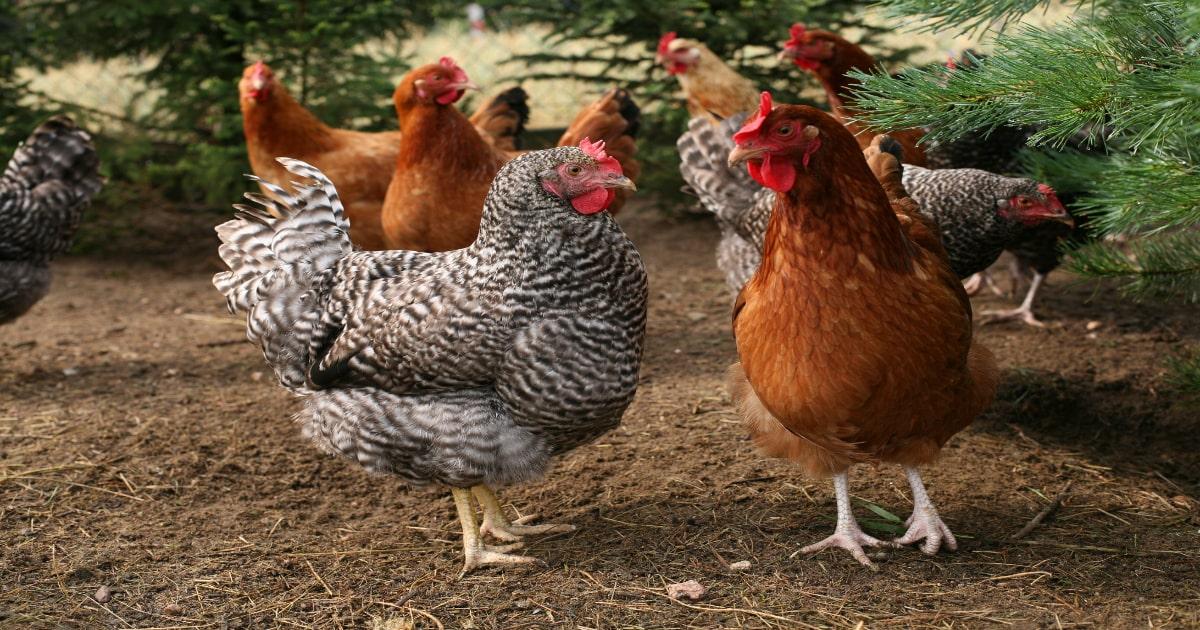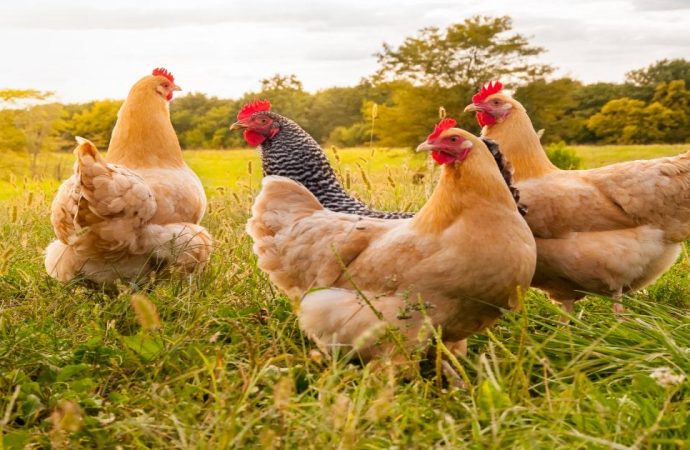Chickens are a staple part of the English diet – Sunday Roast, anyone? How about a cheeky Nandos or a KFC? However, in a survival setting, a trip to Tesco or Asda to pick up your bird of choice won’t be an option. Instead, preppers should educate themselves on what keeping chickens can do to
Chickens are a staple part of the English diet – Sunday Roast, anyone? How about a cheeky Nandos or a KFC? However, in a survival setting, a trip to Tesco or Asda to pick up your bird of choice won’t be an option.
Instead, preppers should educate themselves on what keeping chickens can do to improve their living in a survival setting, and which breeds are best for their specific needs.
This article will explore why chickens are a great addition, what the common British breeds are, the best breeds for eggs, meat, and both, and finally, how to spot and treat common illnesses.
10 Reasons Why Chickens Are Great For Survival
1. Cheap
Perhaps the most obvious reason as to why chickens are a great resource for preppers in Britain is that they are a cheap way to have livestock.
This is particularly useful in survival settings when money is stretched and can even be a way to invest your money due to their ability to quickly produce eggs. Once you have your chosen flock of the best chicken breeds for preppers, they will not require much other than some shelter, food and water.
2. Easy Care
Although it is good practice to supply chickens with food, they can forage for their own. This makes them very easy to look after. In addition, they are omnivores so are not too fussy when it comes to what they eat.
3. Supply Of Protein
Protein is an important food source in general but is particularly important for preppers who want to ensure that they have high levels of nutrition and energy at all times.
Thankfully, hens typically produce one egg a day on average. So, as well as the chickens themselves providing protein through their meat, it is important for preppers to keep some hens to ensure a constant supply of eggs which have a range of health benefits.
4. Reproduce Quickly
The broodier chicken breeds, such as the Buff Orpington, are happy to sit on their eggs meaning that you won’t have to have to supply electricity to run an incubator.
As well as this, chickens in general can reproduce all on their own, so long as you have a rooster (and perhaps a couple of backup roosters) to ensure a steady supply of new chickens.
5. Fertilize Gardens
When foraging for food, chickens also leave behind droppings. This means that they can fertilise gardens or land for you with zero effort. Ideal for helping you grow a vegetable garden. The best chicken breeds for preppers are usually mid-sized so will give a decent amount of fertilizer over the course of the year.
6. Don’t Take Up Much Room
Although some of the best chicken breeds for preppers are better with confined spaces than others, in general chickens are able to thrive in small spaces. If you have a garden with grass you can just let them roam around during the day and put them in their housing at night.
7. Easy Pest Control
As omnivores, chickens are happy to eat insects that can cause damage to vegetation. As well as this, they are also confident enough to chase away rodents such as mice, and perhaps even eat them. This will keep your area pest and disease free.
8. Stick Around
Chickens are happy to stay close by if they have what they need to survive. Once they have been trained to stay there by being confined for a few days, they will happily wander nearby, and remember where their home is.
This also means that if you must move for whatever reason, it is easy to retrain them where their new home is.
9. Great Companions
A survival setting can be difficult for even the most organised prepper, but it’s surprising how much a good companion can have on your mental health. They can even take on the role of a pet with some cuddles if that’s what you are looking for.
10. Portability
Unlike a cow, sheep, pig or fish, if you are hit with a SHTF situation you can literally pick the chickens up and take them with you wherever you go, setting them up in the new location with very little fuss.
What’s more, they will adapt to their new environment quickly and can even be brought inside if needed.
Best Chicken Breeds For Preppers In The UK

Let’s look at the 15 most common breeds of chicken that are available in Britain, either naturally of as a result of being imported in the past, that are ideal for preppers:
- Rhode Island Red – easy-going
- Sussex and Sussex Bantam – very docile
- Barnevelder – tough and hardy
- Maran – easy to tame
- Orpingtons – docile
- Leghorn – will lay throughout winter
- Silkies – calm and trusting
- Cochins – friendly
- Speckledy Hen – makes a great pet
- Gingernut Ranger – makes a great pet
- New Hampshire Red – dual purpose hen
- Plymouth Rock – dual purpose hen
- Miss Pepperpot – good disease resistance
- Pekin Bantam – full features
- Japanese Bantams – long life span
10 Best Egg Layers
Perhaps the main reason for keeping chickens in a survival setting is the fact that they can produce eggs.
However, some of the best chicken breeds for preppers are better at this than others, so let’s have a look at the 10 best egg layers available in England.
- Goldline – up to 320 a year
- White Leghorn – up to 300 a year
- Nera – up to 270 a year
- Amber – up to 300 a year
- Speckedly – up to 270 a year
- Rhode Island Red – up to 220 a year
- Marans – up to 200 a year
- Light Sussex – up to 200 a year
- Araucana – up to 200 a year
- Crested Cream Legbar – up to 180 a year
The numbers above refer to the number of eggs typically laid in a hen’s first year. This numbers may drop as the hen gets older or over winter in some breeds.
10 Best Meat Providers
As well as eggs, chickens also provide a good source of protein through their meat. These breeds are typically known as ‘broilers’, so here are the 10 best broilers available in Britain.
- Jersey Giant – up to 13lbs
- Cornish Cross – up to 12lbs
- Orpington – up to 10lbs
- Buckeye – up to 9lbs
- Dorking – up to 9lbs
- Chantecler – up to 9 lbs
- Delaware – up to 8.5lbs
- Bresse – up to 7lbs
- Freedom Rangers – up to 6lbs
- Brown Leghorn – 6lbs
Broiler chickens are typically known to grow very quickly. This means it is vital to ensure that you have enough space for them before going down this route.
5 Best Dual-Purpose Chickens
Some chickens are excellent at providing a good supply of both meat and eggs. Here we look at the top 5 dual-purpose chickens that are available in the UK.
- Black Australorp
- Speckled Sussex
- Wyandottes
- Orpington
- Rhode Island Red
Common Illnesses And Treatments
Of course, chickens are prone to certain illnesses, just like any other living creature. Here are the 5 most common illnesses and how to treat them.
Fowl Pox – either in wet or dry form. The wet form is when lesions appear around the mouth and there is discharge coming from the eyes. The dry form is when un-feathered parts of the bird have lesions.
Treatment – no specific treatment but will typically go away on its own after a few weeks. Ensure the bird is kept as comfortable as possible to help speed up recovery.
Infectious Bronchitis – similar to a cold in humans, this is when the bird will have a discharge around eyes and nostrils, and could even have laboured breathing. This is also contagious.
Treatment – nothing specific, but antibiotics can be given to prevent them from catching other infections whilst recovering.
Marek’s Disease – also known as fowl paralysis, usually affects young chickens. It is a when tumours are formed and these cause blindness and partial paralysis.
Treatment – nothing can be done to treat the infected chicken, but it should be removed from the flock as the virus is contagious.
Newcastle Disease – a respiratory disease that causes difficulty in breathing and nasal discharge. Extreme cases can also result in neck twisting and paralysis in their wings and legs.
Treatment – adult birds can recover from this and not carry it on, but if a chick has the disease, it is unlikely that they will survive. Antibiotics can help treat adult birds for a few days to prevent further infections.
Coccidiosis – a parasite in the gut, this causes loose droppings as well as bloody or watery diarrhoea and weight loss.
Treatment – Can be treated with antibiotics. As there are 6 different strains, it is possible for chickens to be immune to some but not others.
Summary
In short, chickens are a great addition to any survival setting.
Whether you are on your own or with a large group, they will provide you with a range of benefits, both in terms of a food source and a contributing member due to their ability to control pests and offer companionship.
With that in mind, it’s worth deciding which is the breed for you, and we advise that you get used to having chickens sooner rather than later, in good times now as well as down the line should SHTF.





















